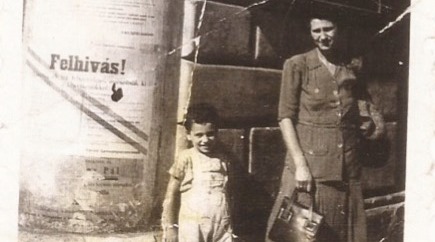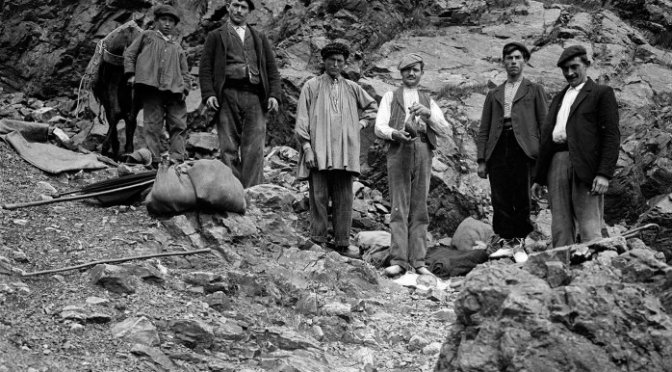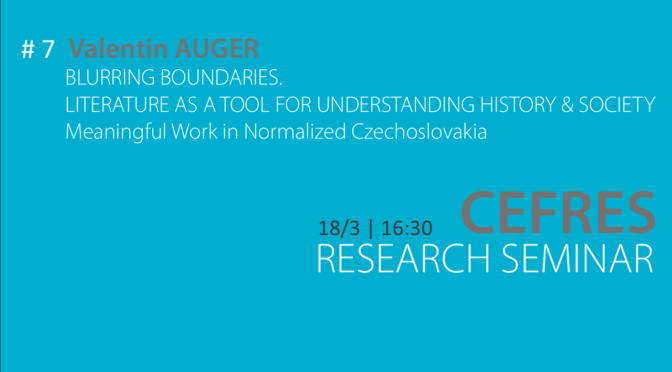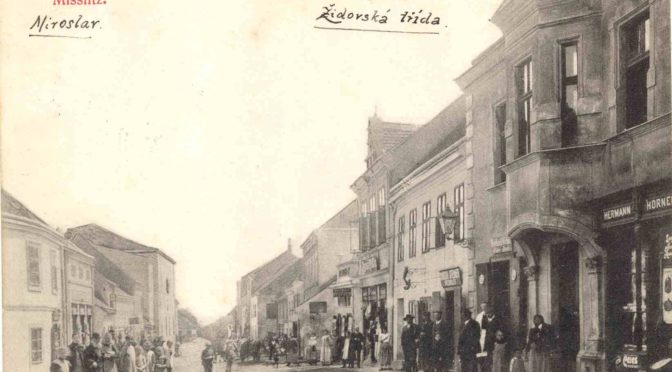
A lecture by Éva Kovacs (Vienna Wiesenthal Institute for Holocaust Studies) in the frame of the seminar on Modern Jewish History of the Institute of Contemporary History (AV ČR) and CEFRES in partnership with the Masaryk Institute (AV ČR).
Where: CEFRES library, Na Florenci 3, 110 00 Prague 1
When: from 5 pm to 6:30 pm
Language: English
In the past two decades, thanks to the opening of the digital collections in the United States, Israel, and Europe, the usage of oral history sources became attractive in historical research. These archives hold an enormous number of testimonies, which makes the research easier and faster, but, on the other hand, raises serious methodological questions. Meanwhile, the last survivors who can still give testimonies are passing away – the oral history sources are turning into „normal” archival sources soon. These new developments are challenging the history-writing on the Shoah.
Our case study deals with the everyday life of approximately 15 thousand Hungarian-Jewish deportees who were forced to work in Vienna and its vicinity in 1944-45. The presentation will focus on the Quellenkritik (source criticism) and methodology of using large oral history archives to explore insufficiently documented historical subjects.
Read more about the colloquia!

Lecture by Laure Teulières on “Foreigners from Here: Migrants and Migrations in France through Films from Toulouse Cinematheque
When: Wednesday 26 April, 6:30-8 pm
Venue: French Institute in Prague (5th floor), Štěpánská 35, Prague 1
Language: French
An invitation to review a part of the history of immigration in France through a commented screening. The Toulouse Cinematheque, one of the main film archives in France, has led innovative research on migrants and migrations thanks to its collections. “Foreigners from Here” (as a book and as a program) is a way to share our findings with the public. Rather than quoting excerpts of famous films, the lecture will highlight rarely screened documents: some fiction, others news reports, institutional or activist fims, as well as family films.
Check Laure Teulières’s program in Warsaw and Prague in the frame of CEFRES Visegrad Forum on our calendar.

Blurring Boundaries: Literature as a Tool for
Understanding History and Society.
Meaningful work during normalized Czechoslovakia
7th session of CEFRES in-house seminar
Through the presentation of works in progress, CEFRES’s Seminar aims at raising and discussing issues about methods, approaches or concepts, in a multidisciplinary spirit, allowing everyone to confront her or his own perspectives with the research presented.
Location: CEFRES Library and online (to get the link, write to cefres[@]cefres.cz)
Date: Tuesday, March 18, 2025 at 4:30 pm
Language: English
Valentin Auger (Faculty of Arts, Charles University, associated at CEFRES)
Chair: Jan Váňa (Institute of Czech Literature, Czech Academy of Sciences)
Abstract Continue reading Literature as a Tool for Understanding History and Society →
International conference organized by the Kassák Museum in Budapest, with the support of Visegrad Fund (Small Grant) and CEFRES.
 Partners : Charles University in Prague, Jagiellonian University in Cracow, Adam Mickiewicz University, University of Warsaw, Masaryk University in Brno, Academy of Sciences of the Czech Republic, Polish Academy of Sciences, Slovak Academy of Sciences, National Museum in Warsaw, Slovak Design Museum and Monoskop.org.
Partners : Charles University in Prague, Jagiellonian University in Cracow, Adam Mickiewicz University, University of Warsaw, Masaryk University in Brno, Academy of Sciences of the Czech Republic, Polish Academy of Sciences, Slovak Academy of Sciences, National Museum in Warsaw, Slovak Design Museum and Monoskop.org.
See the complete program here.
Check on Kassák Museum webpage here.
The subject of the conference is the ‘Central European avant-garde magazine’, arguably the most important medium of communication for progressive literature and visual arts in the region during and after the First World War. Given the multifaceted nature of the phenomenon, the analysis will take an interdisciplinary perspective and employ several different approaches. The avant-garde magazine will be examined as a discursive space of avant-garde communication, as a Gesamtkunstwerk, and as a historical document. As the recent conjuncture in scholarship positions the art of the region in the international context, our aim is to draw more attention to the – sometimes ambivalent – interrelationships between the local contexts and international networks of Central European avant-gardes.
How did the different cultural and historical characteristics affect the ‘local’ avant-gardes of Central Europe? How are the avant-garde magazines of Central Europe related to each other? Accordingly, how could ‘Central European avant-gardes’ be described from the perspectives of Cracow, Warsaw, Prague, Bratislava or Budapest? Through detailed case studies, the conference will emphasize the complex and problematic nature of Central European avant-garde magazines regarding the questions of national/local and international/cosmopolitan. The conference will include monographic, thematic and problem-oriented lectures on current research on local avant-garde magazines published during the First World War and in the interwar period.
The conference is accompanied by a temporary exhibition in the Kassák Museum dedicated to the first avant-garde magazine of Lajos Kassák, A Tett [The Act] published between 1915 and 1916. The exhibition marks the centenary of Kassák’s ‘debut’. The Kassák Museum is the only thematic showroom of the historical avant-garde in Hungary. Its objectives in this regard are to reach a broader audience and to establish the museum as a regional focus point for research into the avant-garde and modernism.
Tuesday, June 9th at 14:00 in Pécs (HU)
Conference by Ildikó BELLÉR-HANN
(Senior lecturer, Institute for transcultural and regional studies, Copenhagen University).
Within the frame of the PhD program for Ethnology and Cultural Anthropology of the interdisciplinary doctoral school of Pécs University’s Faculty of Humanities (PTE BTK),
of the Ethnology work committee within the regional committee of the Hungarian Academy of Sciences (MTA PAB),
in collaboration with the Foundation « Maison des Sciences de l’Homme » (FMSH) in Paris and CEFRES in Prague.

A lecture by Raz Segal (Holocaust and Genocide Studies, Stockton University, New Jersey), in the frame of the seminar on Modern Jewish History organized by the Masaryk Institute and Archives of the Czech Academy of Sciences, CEFRES and the Prague Center for Jewish Studies.
Where: CEFRES Library, Na Florenci 3, 110 00 Prague 1
When: from 4 pm to 5:30 pm
Language: English
Abstract
This lecture will focus on the paradoxical connection between global Holocaust memory and the current attack on the ultimate “other” of the nation state: refugees. It will explore specifically the use in Hungary today of central elements of the global memory culture about the Holocaust in order to continue propagating the idea of an ethno-national “Greater Hungary”; that is, the vision that drove the genocidal assault of the Hungarian state during World War II against Jews, Roma, and other groups perceived by the state as dangerous, foreign, or otherwise “non-Hungarian.” This vision now also targets refugees.
The Hungarian government claims that the Holocaust was solely a Nazi project, so that anti-Jewish violence and destruction in wartime Hungary in no way stemmed from Hungarian nation- and state-building. This erasure of state violence ironically mirrors a central idea of the global memory culture about the Holocaust: that it was a unique event, because Nazism and Nazi antisemitism were unique phenomena, in no way related to the modern state. Thus, the Hungarian government today cynically portrays the Jews who had lived in the wartime borderlands of Hungary—who the state had declared foreign and dangerous and launched a genocidal attack against them—as Hungarian Jews annihilated by Nazi Germany alone. This historical distortion, then, strengthens the Hungarian claim for these territories — the lost territories of “Greater Hungary” — which are today parts of Ukraine, Romania, and Serbia. The erasure of state violence from the history of wartime Hungary thus allows the Hungarian government to use global Holocaust memory in the service of the very political vision that excluded Jews and targeted them for destruction. It also blurs a virulent antisemitic political discourse in Hungary in the last few years, linking Jews to refugees by depicting Jews as threatening for their alleged attempt to destroy Hungary by supporting the entry of refugees into the state. The lecture will unpack this paradoxical situation.




 Partners : Charles University in Prague, Jagiellonian University in Cracow, Adam Mickiewicz University, University of Warsaw, Masaryk University in Brno, Academy of Sciences of the Czech Republic, Polish Academy of Sciences, Slovak Academy of Sciences, National Museum in Warsaw, Slovak Design Museum and Monoskop.org.
Partners : Charles University in Prague, Jagiellonian University in Cracow, Adam Mickiewicz University, University of Warsaw, Masaryk University in Brno, Academy of Sciences of the Czech Republic, Polish Academy of Sciences, Slovak Academy of Sciences, National Museum in Warsaw, Slovak Design Museum and Monoskop.org.